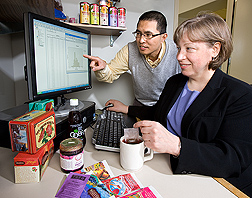Reading Herbal Tea Leaves: Benefits and Lore
These days, there is a lot of talk about health benefits from drinking teas.
Green, black, and oolong are considered the three major classes, and each comes from the age-old Camellia sinensis tea bush. But there is an even wider variety of herbal teas—infusions derived from anything other than C. sinensis.
According to folklore, some herbal teas also provide benefits. But there is little clinical evidence on the effects of drinking these teas. Now, Diane McKay and Jeffrey Blumberg have looked into science-based evidence of health benefits from drinking three of the most popular herbals in America. McKay and Blumberg are with the Jean Mayer USDA Human Nutrition Research Center on Aging at Tufts University in Boston, Massachusetts. Both work at the center’s Antioxidants Research Laboratory, which Blumberg directs.
One popular herbal, chamomile tea, has long been considered a soothing brew. In the early 20th century, it was mentioned in a classic children’s book about a little rabbit named Peter. At the end of a rough day, Peter’s mom served him some chamomile tea. Interestingly, when Blumberg and McKay reviewed scientific literature on the bioactivity of chamomile, they found no human clinical trials that examined this calming effect.
They did, however, publish a review article on findings far beyond sedation—describing test-tube evidence that chamomile tea has moderate antioxidant and antimicrobial activities and significant antiplatelet-clumping activity. Also, animal feeding studies have shown potent anti-inflammatory action and some cholesterol-lowering activity.
The researchers also published a review article describing evidence of bioactivity of peppermint tea. In test tubes, peppermint has been found to have significant antimicrobial and antiviral activities, strong antioxidant and antitumor actions, and some antiallergenic potential. When animals were fed either moderate amounts of ground leaves or leaf extracts, researchers also noted a relaxation effect on gastrointestinal tissue and an analgesic and anesthetic effect in the nervous system.
The researchers found several human studies involving peppermint oil, but they found no data from human clinical trials involving peppermint tea. McKay and Blumberg have concluded that the available research on herbal teas is compelling enough to suggest clinical studies.
McKay has led a human clinical trial to test whether drinking hibiscus tea affects blood pressure. She tested 65 volunteers, aged 30 to 70 years, who were pre- or mildly hypertensive. Blood pressure readings of 120/80 or greater are considered a risk factor for heart disease, stroke, and kidney disease.
For 6 weeks, about half the group was randomly selected to drink 3 cups of hibiscus tea daily. The others drank a placebo beverage containing artificial hibiscus flavoring and color. All participants were advised to follow their usual diet and maintain their normal level of activity. Before the start of the study, blood pressure was measured twice—1 week apart—and at weekly intervals thereafter.
The findings show that the volunteers who drank hibiscus tea had a 7.2-point drop in their systolic blood pressure (the top number), and those who drank the placebo beverage had a 1.3-point drop.
In a subgroup analysis of the 30 volunteers who had the highest systolic blood pressure readings (129 or above) overall at the start of the study, those assigned to drink hibiscus tea showed the greatest response to hibiscus tea drinking. Their systolic blood pressure went down by 13.2 points, diastolic blood pressure went down by 6.4 points, and mean arterial pressure went down by 8.7 points.
The 2010 study was published in the Journal of Nutrition.
“This data supports the idea that drinking hibiscus tea in an amount readily incorporated into the diet may play a role in controlling blood pressure, although more research is required,” says McKay.—By Rosalie Marion Bliss, Agricultural Research Service Information Staff.
This research is part of Human Nutrition, an ARS national program (#107) described at www.nps.ars.usda.gov.
Diane L. McKay is with the Jean Mayer USDA Human Nutrition Research Center on Aging at Tufts University, 711 Washington St., Boston, MA 02111-1524; (781) 608-7183.
"Reading Herbal Tea Leaves: Benefits and Lore" was published in the March 2011 issue of Agricultural Research magazine.







